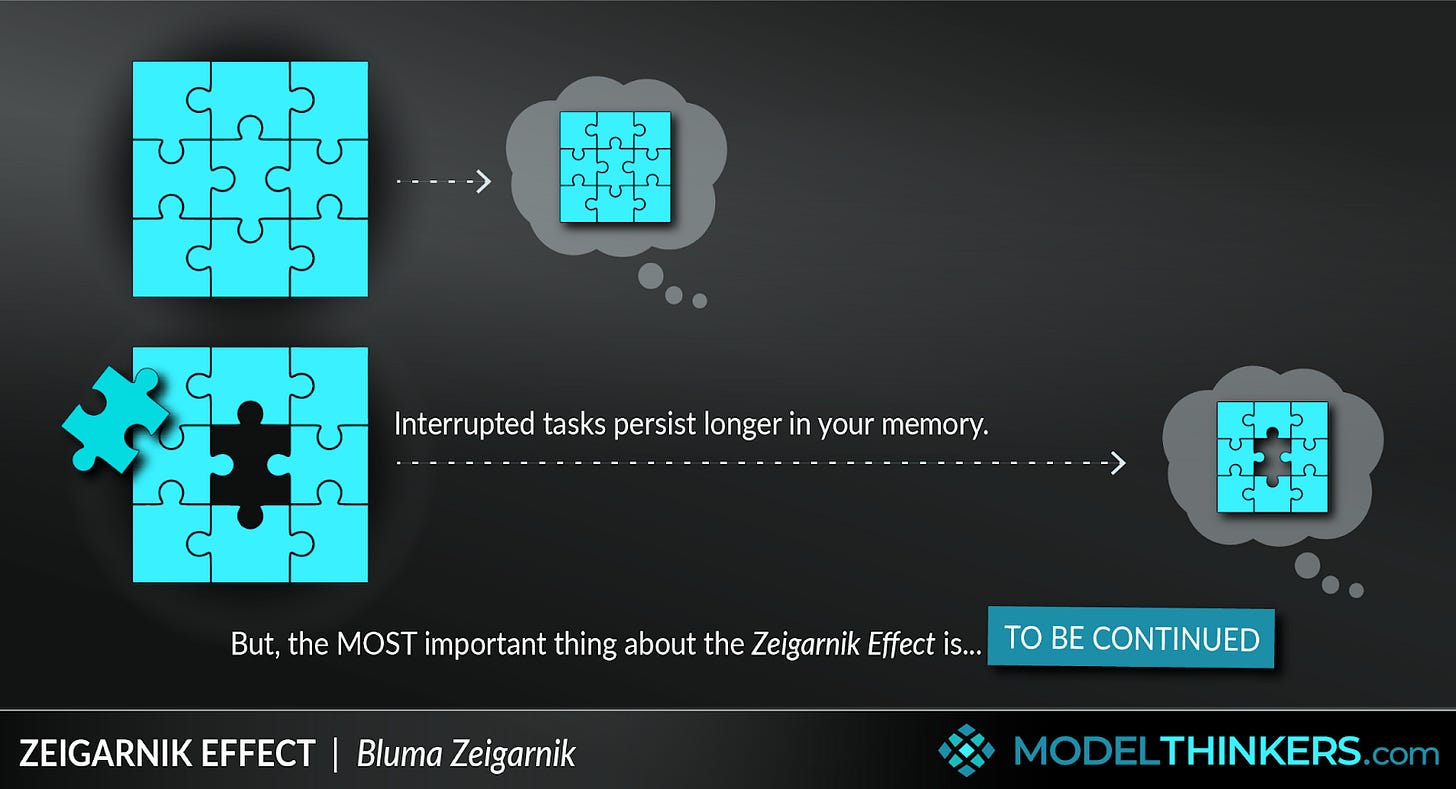The Zeigarnik Effect
🗝️Key Insights
Have you ever felt odd about not doing finishing that one task that you were supposed to finish today? Do you think about it in the days to come? It is constantly on your mind making you uneasy?
Well, you’re not alone. We've all been there – an unchecked box on your to-do list, a project waiting to be wrapped up, or a conversation left hanging.
But what is the reason?
The reasons for this is simple: the Zeigarnik Effect. It is a psychological phenomenon describing a tendency to remember interrupted or incomplete tasks or events more easily than tasks that have been completed.
What you’ll learn ahead:
What is the Zeigarnik Effect
Understanding its Impact of unfinished tasks
How can you work towards avoiding unfinished tasks
The limits of memory
🏋️The Challenge
The Zeigarnik Effect typically arises due to certain psychological and cognitive tendencies. Here are some challenges that can lead to the emergence of the Zeigarnik Effect:
Doing Too Many Things at Once: Trying to handle many tasks can leave them unfinished.
Failing to figure out which tasks are most crucial can lead to a bunch of half-done things.
Getting distracted or interrupted from tasks can make it hard to finish them.
If you're not sure what completing a task looks like, it's harder to reach that point.
Delaying tasks for too long can keep them hanging around in your mind.
Unexpected events can disrupt the normal flow of getting things done.
Being aware of these challenges can help you handle tasks more effectively.
✅The Solution Blueprint
These are some common, everyday things you can do to avoid this effect:
Break up study sessions for better retention rather than cramming all at once before a test.
For improved memorization, review information a few times, take breaks and let your mind naturally revisit the material.
Combat procrastination by taking a small initial step, which will prompt you to continue working until you finish the task.
This approach not only helps with motivation but also provides a sense of accomplishment and frees up mental energy for other tasks.
🐟Deep Dive
The story of this effect started when a Russian psychologist named Bluma Zeigarnik noticed something interesting in a busy restaurant in Vienna. She saw that the waiters remembered orders that hadn't been paid for very well. But once the bill was paid, they had trouble recalling the specifics of the orders.
Why does this happen?
Short-term memory has limits in both capacity and duration. We can only hold a certain amount of information, and it takes effort to keep it in our memory.
To handle this information overload, people use mental tricks. The Zeigarnik effect is one such example. It helps remember a lot of information more effectively.
This effect also proposes that leaving a task incomplete creates a mental tension. This leads to more mental effort and rehearsal to keep the task in mind. Once finished, the mind can release this effort.
The Zeigarnik effect is employed in many aspects of modern culture. But the underlying principles remain the same. It is used to:
Commence or draw attention to an interest-arousing event.
Allow people to participate in something in some way.
Terminate an event prematurely to create cognitive tension.
Invite participants to return for the resolution.
📢Voice of Change
The concept finds practical use in various ways:
Crafting compelling headlines or teasers in the news industry.
Producing captivating trailers in the movie sector.
Incorporating cliffhangers in serialized books or TV series.
Developing interconnected quests in the gaming field.
Designing click-inducing ads to boost online sales.
📈The Growth Pathway
If you want to understand the concept better, here are a few exercises that will help you do that:
Ask participants to start telling a story but intentionally leave it incomplete. Discuss the impact on their memory and curiosity about the unfinished narrative.
Have individuals start a task and then deliberately interrupt them. Observe how their attention and memory are influenced by the interruption.
Conduct a trivia quiz with intentionally unanswered questions.
Avoiding the law doesn’t just require understanding it better. To be more thorough, you need to bring in an attitude and mindset change as well.
Embrace the idea that finishing a task, even if it's not perfect, holds its value and is often more important than striving for perfection.
You also need to understand that tasks don't always have to be flawless. Acknowledge that it's okay to complete them even if they're not perfect.
Understand that sometimes tasks may evolve or shift, and that's okay. Adaptability is a valuable trait in navigating through tasks effectively.
🔍The Unseen Angle
Myth: The Zeigarnik Effect is Always Positive
Reality: Unfinished tasks can lead to stress and anxiety.
Misconception: Only Creative Minds Experience the Zeigarnik Effect
Fact: It's a universal psychological phenomenon, affecting various individuals.
Taboo: Admitting the Stress of Unfinished Tasks
Insight: Recognizing the stress from uncompleted tasks is bad for mental health.
➕Additional Resources
📚Book: Mindful Completion: Harnessing the Zeigarnik Effect by Vincent Stalworth
📎Interesting Reads:
Explore habit building, routine science, case studies, success stories, and mindfulness with Habit10x on Telegram.








